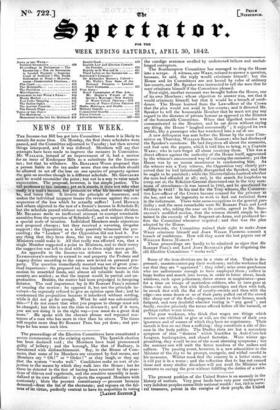NEWS OF THE WEEK.
THE Income-tax Bill has got into Committee; where it is likely to remain for some time. On Monday, the first three schedules were passed, and the Committee adjourned to Tuesday ; but then several things interposed, and it was deferred. Members will say that attempts have been made to improve the measure in Committee. .Mr. WALLACE, instead of an improvement of it, had a motion for an issue of Exchequer Bills as a substitute for the Income- tax; but that he withdrew. Mr. BENJAMIN Wool) proposed that a person liable to the tax under more than One schedule should be allowed to set off the loss on one species of property against the gain on another though in a different schedule. Mr. GouLuues said he would reconsider the point ; but not in a way to raise much expectation. The proposal, however, is but simple justice. The hill professes to tax income; yet as it stands, it does not take what 'really is a man's income, but pronounes what his income might to be, and taxes that. It inverts the principle of insurance, and makes the individual taxpayer insure the revenue against the con- sequences of the loss which he actually. suffers! Lord Howlett and others objected to the test of a farmer's income in Schedule B; but the schedule passed without modification, and without division. Mr. RICARDO made an ineffectual attempt to exempt terminable annuities from the operation of Schedule C, and to subject them to a special scale of taxation. Individual Members made objections and proposed changes; but they received a wavering, irregular support : the Opposition as a body passively witnessed the pro- ceeding ; the "Leaders" of the Opposition did not lead it. For any thing that they have done, the tax may be as oppressive as Ministers could make it. All that really was effected was, that a single Member suggested a point to Ministers, and to their mercy the suggestion was left to deal with as to them might seem good. An appendix to the Income-tax debates was that on Mr. ELPHINSTONE'S motion to extend to real property the Probate and Legacy duties according to the rates now levied on personal pro- perty. The question immediately mooted was not of great prac- tical importance : the proposed tax was limited by the terms of the motion. to unsettled lands, and almost all valuable lands in this country are settled ; so that the impost would be partial and un- productive. Besides, the matter had been prejudged in foregoing debates. The real importance lay in Sir ROBERT PEEL'S manner of treating the motion : he opposed it, but not the principle in- volved—he expressly refused to give an opinion upon that ; and he condemned the proposition because it interfered without settling, while it did not go far enough. What he said was substantially this—" I do not assert that what you propose to change must not be changed; but this is not the time to discuss it ; and if it were, you are not doing it in the right way—you must do a great deal more.' He spoke with the obscure phrase and repeated sen- tences of a man who has more in view than he utters. The times will require more than Sir ROBERT PEEL has yet done; and per- haps he has some such idea.


























